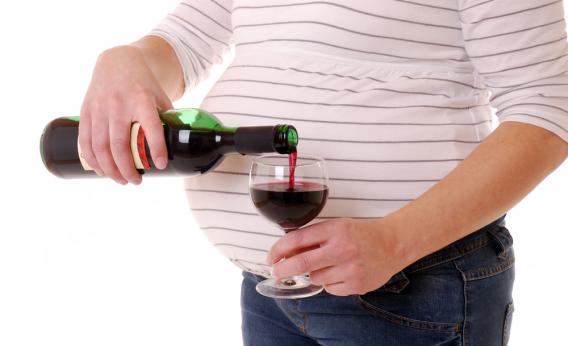A Look into Alcohol Consumption During Pregnancy
By Michael Ratkovic

An image of a pregnant person holding an alcoholic beverage, how does it make you feel?
It’s been known that drinking has many negative effects on the unborn child. Is there a safe amount that can be enjoyed? Exactly how much of the alcohol consumed reaches the child? We’ll be answering these questions today amongst other factors.
Alcohol and pregnancy don’t mix. This has been the view since biblical times. In the Bible, it says “Behold, thou shalt conceive and bear a son: and now drink no wine or strong drinks.” (Judges 13:7). Even two thousand years ago they expected that there was something wrong with this picture. With the expansion of scientific research and the advancement of technology we can explore evidence as to why this is the case.
What Lasting Effects Occur From Drinking During Pregnancy?
Alcohol is classified as a teratogenic drug. A Teratogenic drug is something that can cause birth defects. Alcohol can enter an unborn child’s blood stream because it weaves straight through the placenta(1).
There are many effects that alcohol can have on a foetus. The umbrella term for all conditions associated with alcohol is Foetal Alcohol Spectrum Disorder (FASD)(2). Under FASD we have Foetal Alcohol Syndrome(FES). We’ve seen, in common cases of FES, signs of physical and mental deficiencies(3). The physical deficiencies are usually characterised by:

- – A small head in proportion to the body
- – A flat nose bridge
- – A thin upper lip
- – An underdeveloped jaw
- – Ear abnormalities
- – Fold between the eyes and nose(3)
Along with these physical properties come characteristic mental issues including:
- – Poor coordination
- – Lower IQ
- – Problems with logic and problem solving
- – Difficulty adapting to new tasks
- – Learning difficulties
There has been some research into the development of Attention Deficit Hyperactivity Disorder (ADHD) in those diagnosed with FES(4). The development of mental illness in older people diagnosed with FES has also been studied. They were found to have increased chance of being anti-social, paranoid and passive aggressive. They had a higher chance to develop substance addiction as well as somatoform disorders (Basically the mind saying it feels something somewhere when there is no physical explanation)(5).
How Much Alcohol Is Too Much?

So how much alcohol is fine. The short answer? None. The truth is that there is no completely safe amount of alcohol. Any consumption is seen to increase the risk of alcohol related deficiencies in unborn babies(6). We’ve also found that with increased alcohol consumption comes increased chance and degree of problems occurring in the unborn child(7, 8).
The time that a woman would have to abstain from alcohol is only a tiny amount in comparison to the life of her and her child. If it’s possible, the best option for the health of a child is to fight off the urge to drink until after the child is born. It may be hard but, in the end, a drink will be that much more satisfying.
References
- Streissguth AP, Martin JC. Prenatal Effects of Alcohol Abuse in Humans and Laboratory Animals. In: Kissin B, Begleiter H, editors. The Biology of Alcoholism: Vol 7 The Pathogenesis of Alcoholism: Biological Factors. Boston, MA: Springer US; 1983. p. 539-89.
- Sokol RJ, Delaney-Black V, Nordstrom B. Fetal alcohol spectrum disorder. JAMA. 2003;290(22):2996-9.
- Mulvihill JJ, Yeager AM. Fetal alcohol syndrome. Teratology. 1976;13(3):345-8.
- Ornoy A, Ergaz Z. Alcohol abuse in pregnant women: effects on the fetus and newborn, mode of action and maternal treatment. International journal of environmental research and public health. 2010;7(2):364-79.
- Barr HM, Bookstein FL, O’Malley KD, Connor PD, Huggins JE, Streissguth AP. Binge drinking during pregnancy as a predictor of psychiatric disorders on the Structured Clinical Interview for DSM-IV in young adult offspring. American Journal of Psychiatry. 2006;163(6):1061-5.
- Davis PJ, Partridge JW, Storrs CN. Alcohol consumption in pregnancy. How much is safe? Archives of Disease in Childhood. 1982;57(12):940.
- Mills JL, Graubard BI, Harley EE, Rhoads GG, Berendes HW. Maternal alcohol consumption and birth weight: How much drinking during pregnancy is safe? JAMA. 1984;252(14):1875-9.
- Abel EL, Sokol RJ. Prevention of Alcohol-Related Birth Defects. In: Gleicher N, editor. Principles of Medical Therapy in Pregnancy. Boston, MA: Springer US; 1985. p. 105-14.
Pregnancy is a critical period of Geometry Dash Lite development for a baby, and the lifestyle choices of the mother play a significant role in ensuring a healthy outcome.
Thank you for sharing the important information about the dangers of alcohol consumption during pregnancy and the negative impact on the health of the unborn child. It made me feel concerned and emphasized the importance of completely avoiding alcohol during pregnancy to protect the health of both the mother and the unborn child. Also, time calculator can help calculate the amount of time needed to quit drinking
I visited your website and had a great time doing so. And now that I’m talking about winter fashion, this Grammy 2022 Justin Bieber Black Hoodie is the greatest of yours.
Hi Michael,
Really well-written blog, super easy to follow and understand. Great job on describing scientific words like teratogen in layman language. Your writing style captures the audience and keeps them interested thanks to the simplicity of the blog.
Overall great job!
You tell ’em